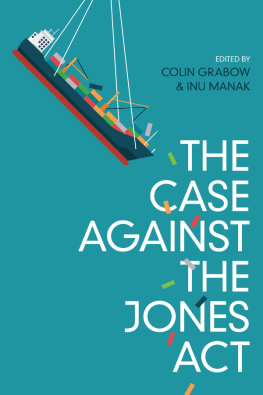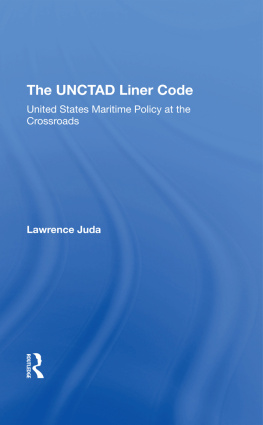Copyright 2020 by the Cato Institute.
All rights reserved.
Print ISBN: 978-1-948647-98-4
eBook ISBN: 978-1-948647-99-1
Cover design: Faceout Studios, Tim Green.
Library of Congress Control Number: 2020939557
Printed in the United States of America.
CATO INSTITUTE
1000 Massachusetts Avenue NW
Washington, DC 20001
www.cato.org
There is almost no economic policy or policy change that can be made without harming some members of society. In many cases, either compensation is given to the losers or several measures are passed at once so that everyone gets something.
Some policies start or are perpetuated from the pressure of lobbyists when there are few identifiable big winners (special interests) but a large number of losers. While the small number of large gainers can organize and lobby, the cost per consumer is small and opaque. Consumers usually cannot identify each other and organize, and so the cost per consumer goes virtually unnoticed.
Even for sugar, where protection is very high, the costs per consumer per year are no more than a few dollars, and there is little public protest, although sugar producers gain a lot.
The Jones Act is an exception to these generalizations. Passed a century ago, the law benefits almost no one: its presumed beneficiaries are mostly losers; it harms national security; it has driven many shipbuilding firms into bankruptcy; it has caused the size of the U.S. domestic merchant fleet to shrink; and it results in American consumers paying higher prices on most of the goods they consume that are not produced locally.
The Jones Act restricts shipping between American ports, or two points within the United States (called cabotage), to vessels that are U.S.-flagged, deemed U.S.-built, and are at least 75 percent U.S.-owned and -crewed. The proponents and defenders of the Jones Act claim that the purpose of these restrictions is to build and maintain a shipping capacity in the event that it is needed for national security.
In fact, it has done the opposite. In the past century, the U.S. share of worldwide shipping has fallen. Water transport within the United States has shrunk relative to that of land and air: there are few ships of oceangoing size built in the United States because of high costs, and their numbers have declined over time (from 257 in 1980 to 99 as of December 2019). Because shipbuilding is so expensive, shipping companies keep their ships in service long beyond their economic service life and American-owned ships are older and therefore less safe and less fuel-efficient than fleets of other countries.
The Jones Act is one piece of legislation that has harmed almost everyone, including American mariners (who face diminished employment opportunities and are often forced to work on old ships); American shipbuilders (many of whom have gone bankrupt); and American consumers. The requirement that 75 percent or more of mariners be American is partly defended on the grounds that foreign mariners might constitute a security threat when they are in American ports, but oceangoing vessels with foreign crews regularly dock here anyway. While U.S. mariners wages are higher than those of crews on foreign-flagged ships, there are few jobs for American mariners because so many goods either arrive from overseas on foreign ships or are transported over land because of the high costs that the Jones Act inflicts on waterborne transport.
Water transport would be cheaper than land transport (as it is in other countries) if the Jones Act did not restrict it because there would be more competition, which would lower costs. More water transport would reduce congestion on land (especially along the East and West Coasts), as it would displace some rail and truck traffic. Road and air transport are also more environmentally damaging than water traffic.
The Cato Institute and the authors of the chapters in this volume deserve hearty congratulations for focusing on the Jones Act and its consequences. Many harmful policies raise costs in ways that are, or at least in principle could be, visible to consumers. But the Jones Act spreads invisible harm around to almost everyone. Even the best-informed consumers cannot ascertain how much more their purchases cost because the goods were transported by road rather than water. Also, there are costs to mitigating environmental damage.
The chapters in this volume provide a comprehensive estimate of the reach of the Jones Acts harm and show how ineffective and destructive the effects of the act are. There are economies of scale in shipbuilding: the U.S. industry suffers because large vessels are not built, as shipyards have shrunk and many forced into bankruptcy.
American ports struggle to handle large vessels because the required dredging is not worth it due to high costs imposed by the Jones Act and a related restrictive coastwise law, the Foreign Dredge Act of 1906. Smaller ships raise the cost per unit of goods transported and also prevent oceangoing vessels from foreign countries from docking here.
The number of American mariners has fallen as the volume of waterborne freight has diminished because of the shift to road transport. The noncontiguous American states and territories subject to the Jones Act pay two or three times the cost for obtaining their goods than they would otherwise have to. In Puerto Ricos case, a direct comparison of water freight costs between it and neighboring islands shows that Puerto Rico pays approximately twice as much for water transported goods as its neighbors.
The loss of shipbuilding capacity (especially for larger ships), the shrinkage of the fleet, and the reduction in the number of qualified American mariners have all followed from the Jones Act. These effects and many more are carefully documented in this volume.
The authors have also been careful to describe alternatives to the Jones Act that would be far less harmful to national security and the American economy and ease the dislocation for the few who would be negatively affected. Given the broad sweep of the acts damage, it is to be hoped that concern for the public good will be sufficiently aroused in policymakers so they will begin undoing the damage from this act and craft viable legislation that will allow for the building of a more efficient transportation capability that will produce large benefits for consumers, national security, and the environment.








